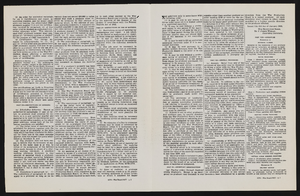Search the Special Collections and Archives Portal
Search Results
Bob Fisher oral history interview
Identifier
Abstract
Oral history interview with Robert Fisher conducted by Barbara Tabach on January 08, 2015 for the Southern Nevada Jewish Heritage Project. In this interview, Fisher discusses his childhood in Minnesota, and the large role Judaism played in his upbringing. He speaks at length about his involvement with United Synagogue of Conservative Judaism over the years, including as regional director of the United Synagogue Youth Far West Region, which took him from Minnesota to California. He talks about his time in Los Angeles, California, and later, about his life in Las Vegas, Nevada, including his broadcasting career as well as involvement with Midbar Kodesh Temple.
Archival Collection
Earl Stokes oral history interview
Identifier
Abstract
Oral history interview with Earl Stokes conducted by his son, William R. Stokes, on March 02, 1980 for the Ralph Roske Oral History Project on Early Las Vegas. In this interview, Stokes discusses working in the moving and shipping industry of Las Vegas, Nevada. Stokes talks about the history of the companies he worked for, the condition of roads in Las Vegas during the 1960s, and who he moved materials for, including the Las Vegas Convention Center and Nellis Air Force Base. He continues, discussing life in Las Vegas, the Helldorado Parades, and how Las Vegas has changed.
Archival Collection
Charles Roland oral history interview
Identifier
Abstract
Oral history interview with Charles Roland conducted by Claytee D. White on August 16, 2012 for the African Americans in Las Vegas: a Collaborative Oral History Project. Roland begins by describing why his family moved to Las Vegas, Nevada in 1952 and attending Las Vegas High School. He discusses the African American community in Las Vegas, working in a restaurant called Sill's Drive-In, and his father, who opened the Hamburger Heaven restaurants. Roland also discusses race relations in Las Vegas prior to integration, the Binion family, and how Las Vegas has changed.
Archival Collection
J. D. Smith oral history interview
Identifier
Abstract
Oral history interview with J. D. Smith conducted by Albert Hewitt on October 31, 1979 for the Ralph Roske Oral History Project on Early Las Vegas. Smith begins by discussing his move to Las Vegas, Nevada in 1927 after buying an office for his dental practice. He describes life in Las Vegas at the time, how the city has expanded and changed, and his career as a dentist. Smith also talks about his time as president of the Nevada State Board of Education. He concludes by elaborating on other aspects of Las Vegas history, such as the crash of Carole Lombard's plane, the Helldorado Parades, and nuclear weapons testing.
Archival Collection
Harriet Barlow oral history interview
Identifier
Abstract
Oral history interview with Harriet Barlow conducted by Elsha Harris-Tolanda on April 27, 2015 for the African Americans in Las Vegas: a Collaborative Oral History Project. In this interview, Barlow discusses her personal history and growing up in Robbins, Illinois. She talks about her education, discrimination in schools, and the process of school integration. Barlow then recalls her first impressions of Las Vegas, Nevada and her employment at the University of Nevada, Las Vegas. Lastly, Barlow describes going through graduate school as an African American and explains why conversations about race relations can be difficult.
Archival Collection
Helen Smith oral history interview
Identifier
Abstract
Oral history interview with Helen Smith conducted by Claytee D. White on February 20, 2007 for the Boyer Early Las Vegas Oral History Project. In this interview, Smith discusses her personal history and moving to Las Vegas, Nevada in 1956. She then talks about her employment at Southern Nevada Memorial Hospital and the change to University Medical Center (UMC). Smith recalls an air conditioning business she co-owned with her husband at the time, and the activities she did as a member of Daughters of the Nile, a women's community service organization. Lastly, she discusses education and the general changes in Las Vegas.
Archival Collection
Susan and Holly Carratelli oral history interviews
Identifier
Abstract
Oral history interviews with Susan and Holly Carratelli conducted by Dennis McBride on June 24 and 26, 1999 for the Las Vegas Gay Archives Oral History Project. In the interviews, Susan and Holly recall first meeting during the planning for the 1994 National Coming Out Day event in Las Vegas, Nevada. They discuss what they value in a relationship, their past relationship experiences, and their involvement with the Gay and Lesbian Community Center and Metropolitan Community Church. Other subjects they cover include their marriage, anecdotes about living together, having children, their daily routine, and conflicting inter-community perceptions between gay men and women in Las Vegas.
Archival Collection

Craig Galati Interview, October 24, 2016: transcript
Date
Archival Collection
Description
always thought I'd be more urban. I would live in a downtown city. I wouldn't have a car. I would walk around. I would work on these big skyscrapers.” At one point in his life, architect Craig Galati dreamt of designing large buildings in some of the nation’s biggest cities. Instead, he was drawn back to his childhood home of Las Vegas, where he created projects meant to preserve the city’s integrity, such as the Grant Sawyer State Office Building and the first building at the College of Southern Nevada Charleston Campus. He speaks to his work in preservation at the Las Vegas Springs Preserve and in welcoming visitors to Mount Charleston with his Spring Mountains Visitor Gateway design. In this interview, Galati talks about his parents’ decision to move from Ohio to Nevada and what it was like growing up in Las Vegas. He recalls his first teenage jobs in the Las Vegas of his youth and his studies in architecture at the University of Idaho. He recounts the dilemma of struggling to find architecture work he enjoyed and how that vision drew him back to Vegas. He describes various projects in his portfolio from his early years to the present. He speaks highly of his partnership with Ray Lucchesi and the basis for their vision: “We wanted to be a place that everybody liked to work for. Buildings were just tools to do something grander. They weren't an object. We had a philosophy that was not object based, it was people based.”
Text

Harold McKay interview, March 13, 1981: transcript
Date
Archival Collection
Description
On March 13, 1981, Dana Jamerson interviewed Harold McKay (b. July 27th, 1903 in Dresden, Kansas) about his life as a teacher in Las Vegas, Nevada. McKay speaks about his education, his move from Chicago, Illinois to Las Vegas and how he began his career in education. McKay focuses on how and why he founded the Teacher’s Credit Union, his time working in administration and his business school, as well as the problems related to segregation and integration in the educational system. Lastly, he talks about the growth of the gaming and entertainment industry in Las Vegas, and his volunteer work with the Senior Citizen Center.
Text

